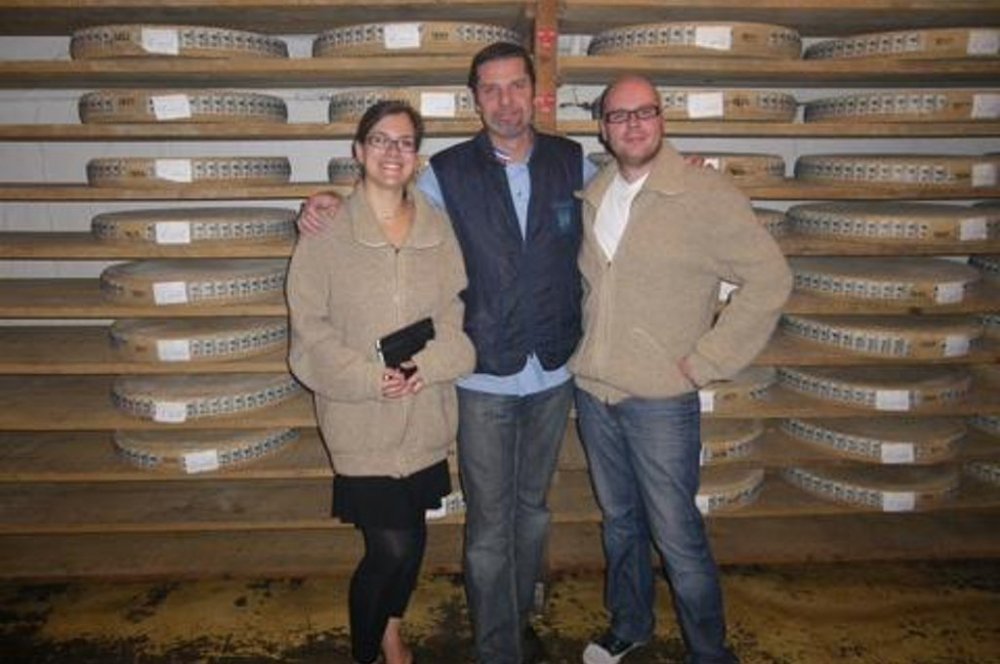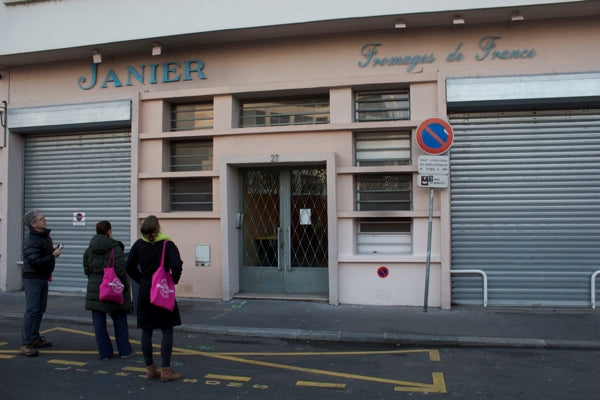
Fromages Janier, Lyon
Anais Causse  On Thursday morning the alarm clock rang at 6:30 am because we still had a two-hour drive to Lyon, where we had an appointment with Janier at 11:00 am. We really had to be on time because appointments at Janier 's are rare and better not to be missed!
On Thursday morning the alarm clock rang at 6:30 am because we still had a two-hour drive to Lyon, where we had an appointment with Janier at 11:00 am. We really had to be on time because appointments at Janier 's are rare and better not to be missed!
You must know that the Janiers are among the most important cheese affineurs in France. A little explanation: A cheese affineur does not produce the cheese himself, he refines it. He doesn't have any cows that he milks himself etc. His job is to find farmers who produce the milk he wants, he has his local people collect it and process it immediately before the milk cools down ( travailler le lait chaud - this is called working on the warm milk). The cheese has to get its rough shape in the region where it is produced, the Janiers have caves d'affinages (ripening cellars) in many regions of France. Only then is it brought to Lyon, where it is refined (= refined), ie brought to perfect maturity.
In 2000 they were awarded the Meilleur Ouvrier de France (best craftsman of his guild) and now in July 2010 the Janiers were the first cheese processing company to be awarded the "Entreprise du Patrimoine Vivant" label by the French Ministry of Economic Affairs. This award is only given to companies that practice, maintain and pass on their traditional craftsmanship and knowledge above average.
So we sped down the autobahn, this time we were even willing to pay tolls, we usually avoid that...
Lyon is the third largest city in the country, the Autoroute du Soleil runs through the city (it's THE north-south motorway, one of the busiest roads in France) and is a confusing and inscrutable web of roads, underpasses and overpasses... without the GPS we would have been lost! But we arrived punctually at 11:00 am.
We were warmly welcomed by Christian Janier. He must have seen the hardships we endured in the Lyon traffic because he first invited us for a coffee in a bistro around the corner, where he was greeted like a regular by the waitress. Christian Janier has been running the family business for a number of years, but his father Maurice is still actively involved.
Christian told us that his father doesn't usually come to work on Thursdays, but he made an exception to meet and meet us. We felt even more honored.
Maurice Janier received us in his office. We have to mention what an aura this man exuded in his office. The office is furnished with a showcase, an old desk, and two visitor's chairs in front of it. Countless awards hang on the walls that illustrate his work and skills. It's the complete opposite of today's sterile and soulless offices. And in the midst of this ambience, Janier Senior sat behind his old desk and looked at us with shining eyes.

He greeted us warmly and then began to tell us about the beginnings of his business relationship with maître philippe. He pulled out a thick folder, leafed through it, showed us photos and told us a few anecdotes.
Then Christian picked us up, put us in a couple of thick woolen jackets and took us to the maturing cellar. Unfortunately, we couldn't take any photos because the Janiers generally think so.
The Janiers work with around 800 small cheese dairies who produce the raw cheese for them. They have strict selection criteria, the quality of the individual cheeses is constantly checked and questioned, and as soon as there are quality defects, the cheeses are sorted out and cooperation with the cheese dairy is terminated if necessary. The Janiers have as much "work on the cheese" done on site as possible; On the one hand, this is prescribed by the strict AOC rules (Appellation d'Origine Controlé = Controlled Designation of Origin), but on the other hand and mainly this happens because the Janiers believe that the terroir is absolutely crucial for the later taste of the cheese. Using the terroir means working with products from the region, with animals, with people and their savoir-faire, using the climatic conditions of the region, because that makes the taste of the product unmistakable. Two Comtés that are produced just 5 km apart and also look exactly the same will taste unmistakably different because of the different terroir.
Christian Janier says of himself that some call him crazy, he would rather put it that way that he has the passion for cheese that one needs for the job. The story of the terroir is continued in the Janiers' maturing cellars: the cheese from a specific region is only stored on wooden boards from trees that also come from this region. We were beyond surprised to learn that the profession of cheese storage board maker exists! The Janiers have been working with one and the same man for years, who only fells the trees at a certain period of the year, then lets them rest in the forest for 6 months until he cuts them to exactly a certain width and depth and lets them dry. Very important: The boards always remain untreated and are never sanded down, as this is the only way air can circulate under the cheese through the finest grooves in the wood. Some of the cheese boards in Messieurs Janier's cellars are up to 40 years old and still absolutely perfect.
We were told how to check the quality of a cheese. You always use your 5 senses.
1. If the cheese has visual defects, it is sorted out. Of course, it's not about producing a perfectly standardized cheese. Cheese is a natural product. But certain errors, such as Cracks in the shell etc. can later affect the quality of the cheese.
2. The hard cheese is knocked off with a hammer, this is the acoustic control. From the sound of the tapping, the affineur can tell what the internal texture of the cheese is like, whether it has any unwanted cracks on the inside, or similar.
3. You can also tell the quality by smelling the cheese (the inside of the cheese is cut out with a special tool).
4. The texture is checked in two ways: First, the cut out cheese is rubbed between the fingers, so the texture, e.g. B. salt crystals in the dough, etc., the cheese is also heated, which is important for the tasting. Then you feel the heated cheese on your tongue, moving it back and forth in your mouth, crushing it on the palate...
5. Which brings us to the taste test. As if tasting wine, the cheese is swished around in the mouth so that it really touches all the taste buds. When swallowing, more complex aromas rise through the throat and nose.
The Janiers have z. Z. 8 cooling chambers, all have different temperatures and humidity levels depending on what the cheese needs during maturation. Only one cooling chamber does not add moisture, but removes moisture: the one in which the goat's cheese is stored. Goat's cheese is very moist when it's young and needs to dry to mature. Goat cheese used to be dried in the fresh air - there the moisture exchange took place automatically - but this is no longer permitted by EU hygiene regulations. However, Janier continues to store the goat's cheese on straw mats, because this natural material has properties that metal or plastic cannot offer: If the cheese is too moist, the straw draws moisture from it, and if the cheese is too dry at some point, the straw gives it moisture back.
A small anecdote reflects the philosophy, passion for cheese but also the uncompromising quality of the Janier house very well: Christian Janier absolutely wanted to include a mozzarella in the range. It took 3 whole years, after countless trips through Italy, until he found a mozzarella that met his requirements. This really sensationally good-tasting mozzarella is of course also available from maître philippe...
After the tour, the Janiers invited us to lunch at the restaurant "La Fourvière", which is located right next to the basilica high up on a hill in Lyon and from whose panoramic terrace you have an incredible view over Lyon. We could even see Mont Blanc in the distance, which Christian Janier says is a bad sign because it almost always rains the next day. Well, it actually did.
We had a typical Lyon menu with andouillettes (tripe sausage) for tv and quenelles de brochet (pike dumplings) for ac. Both were delicious!
The Janiers are wonderful hosts: they are warm, very funny and really interesting and truthful people who, despite their success, have remained very down to earth. When we thanked us profusely for the great day and for taking so much time with us, they waved it off and said it was completely normal for them - and they meant it.

